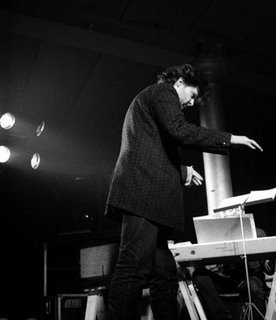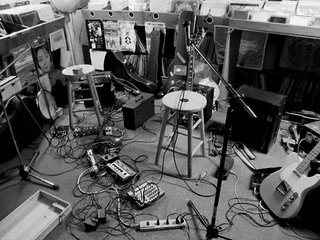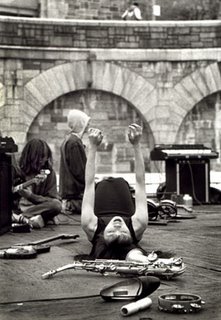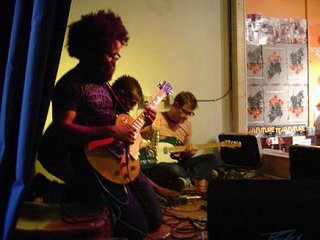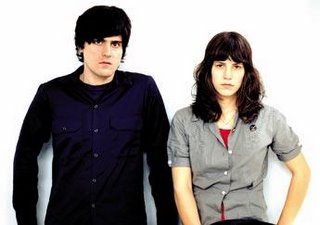I'm not sure why it's taken me nearly a week to remember to write something about this, so my apologies. This past Saturday, February 25th, I attended ArthurBall at the Echo in Los Angeles. For those not in the know,
Arthur Magazine is a hyper-progressive, free publication from the Los Angeles area. It emphasizes free-thinking, mind liberation, open discussions on culture and art, etc. I was unfortunately unaware of its existence until last year, largely due to my Los Angelian displacement here in Santa Barbara. What brought it to my attention was the announcement of something that seemed like a sort of ultra-underground adjunct to Coachella, called ArthurFest. I attended that this past September, and it was a wonderful experience, with some of the best performances I've ever seen (Sonic Youth, Olivia Tremor Control, and a solo Cat Power, to name a few). So when I won tickets to a smaller-scale winter version of the festival, called "ArthurBall", this past weekend, I didn't hesitate to travel back down to my Southern Californian homestead.
What I encountered echoed the "vibe" of ArthurFest - elaborately dressed, twenty-something bohemians with a definite sense of informality and lack of hostility. There was music, yes, but also films, and even a "vibrational healing center", all spread around the Echo Park area. Trying to locate the latter (everything was sort of endearingly disorganized), Jay Babcock, editor and, arguably, the lifeblood of Arthur Magazine saw me staring blankly at one of the little map handouts, and walked me over to the "healing center" a block or so away. He, too, like his creation, was very informal, entirely amiable.
Anyway, music. I won tickets to both days, but on Sunday I was a little too occupied by other "responsibilities" (whatever those are), so I chose not to attend. However, what I saw on Saturday reaffirmed, as ArthurFest did, my faith in underground music and artists:
(all live photos except Colleen's courtesy of Ice Cream Man)

Opening band The Society Of Rockets played a charming set of anthemic guitar music. Behind them and onto them was projected various animations and video clips, which made their music (reminiscent of The Wrens) that more captivating. As best I could tell, the songs concerned lost love and dealing with the approach of middle-age. Very varied instrumentation, including accordion, a theremin, and even a sax section. Really good way to start out the evening.

Finnish/French duo Mi & l'Au performed an intimate acoustic set, which, honestly, was one of the biggest surprises for me of the day. Really hauntingly beautiful and disarming. Their back-story is a little too repeated in the stead of describing their music, but it is undeniably interesting: basically, the two shared a cabin together somewhere deep in the Finnish wilderness, and would spend days playing nothing but music together until a product was reached. Their self-titled album from last year is worth checking out if you're at all into neo-folk revivalism or just pretty guitar music.

The first artist I was previously familiar with was amazing French ambient artist Colleen. Her performance was particularly special because she rarely plays America, and she confirmed this was her first appearance in Los Angeles. Keeping true to the creative process for last year's The Golden Morning Breaks, she crafted soundscapes entirely out of organic instruments, looping cello, guitar, clarinet, chime, and music box melodies over and over again to culminate in these huge, wonderful walls of sound. She was a very nice woman, too, and was appreciative when I thanked her after the performance. Definitely one of the day's highlights.
At around this point I checked out Leg and Pants Dance Theatre, which was a performance piece with fairly disturbing poetics, coupled with electronic tracks, and movement. Definitely interesting, but not a highlight.

Unknown Instructors were the other creative debut happening at the "ball" (the other being Josh Homme of Queens Of the Stone Age debuting the 5:15ers the next day). This was the second time I had seen a side-project of former Minutemen bassist Mike Watt, and it was arguably even more entertaining. A sort of free-jam by Watt and two other musicians, the group played a funky din over spoken word recitations, creating a very cool, "head-y" viewing experience. Unfortunately, I was only able to see two "songs."
At this point I met up with my friend Tommy, and we watched a few songs of metal-ish duo OM. I can't find any pictures of these guys (and I'm too cheap to get a digital camera, apparently), but they were interesting. I never knew a 4-stringed bass could emit so much noise. To be honest, however, they weren't really "my bag" - I'm pretty perplexed as to why scenesters/hipsters have recently become fascinated by metal. I understand the quality of musicianship for some of these bands (Mastodon, etc.), but beyond the "drone-metal" being done by Sunn O))) and company, I'm not particularly enthused.

Joanna Newsom is a very divisive artist. The arguments "against" her are fairly varied, but most come back to the rather asinine complaint that her voice is "too weird." I consider this a bad complaint because the music community has embraced other "weirdly voiced" artists, such as Tom Waits, or even Belle & Sebastian's crooner, and not even batted an eye. Joanna Newsom's voice, like those artists, indeed adds to her aesthetic, in my opinion. Anyway, so I'm a huge champion of the lady if you were having trouble deriving that, and this performance was virtually transcendent for me. She didn't play more than three songs from her 2004 release The Milk-Eyed Mender, but hearing her debut her epic new unfinished album was a treat. She would say things during her performance about how she was screwing up occasionally, but it certainly wasn't noticeable - her harp playing is awe-inspiring, and the strength of her overall performance just great. Definitely did not disappoint.
So anyway, praise to Arthur Magazine. Jay Babcock and friends are some of the most fervent supporters of underground culture and music, and they do an amazing job of putting on events. Look out for ArthurFest's line-up this upcoming fall, or, if you're going to South by Southwest this year, check out Arthur's recently announced side-staging, The Happening.
